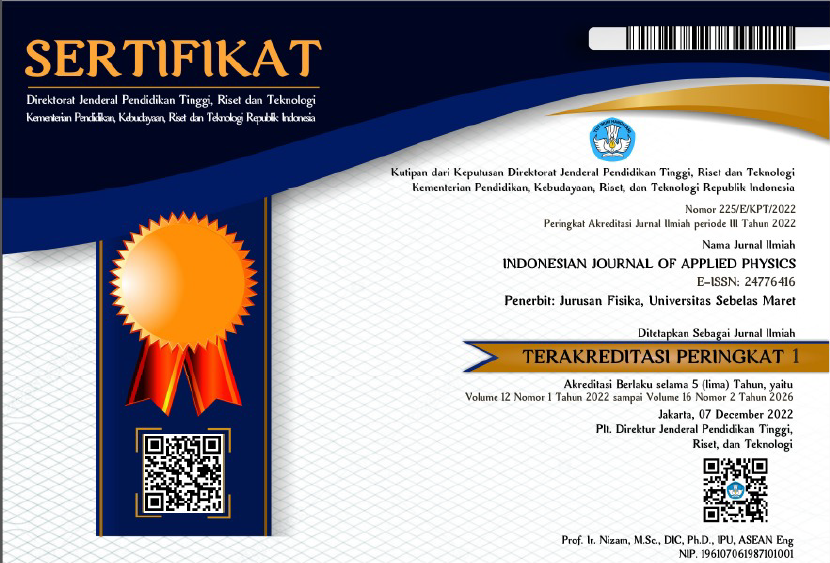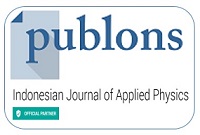Compressibility Effects on Turbulent Heat Transfer of Natural Convection in a Square Cavity
Abstract
Keywords
Full Text:
PDFReferences
1. Zhang, K., Sun, Z., Zheng, N., & Chen, Q. 2020. Effects of the configuration of winglet vortex generators on turbulent heat transfer enhancement in circular tubes. International Journal of Heat and Mass Transfer, 157, 119928.
2. Zhang, S., Lu, L., Wen, T., & Dong, C. 2021. Turbulent heat transfer and flow analysis of hybrid Al2O3-CuO/water nanofluid: An experiment and CFD simulation study. Applied Thermal Engineering, 188, 116589.
3. Ajarostaghi, S. S. M., Zaboli, M., & Nourbakhsh, M. 2021. Numerical evaluation of turbulence heat transfer and fluid flow of hybrid nanofluids in a pipe with innovative vortex generator. Journal of Thermal Analysis and Calorimetry, 143, 1583-1597.
4. Omidi, M., Rabienataj Darzi, A. A., & Farhadi, M. 2019. Turbulent heat transfer and fluid flow of alumina nanofluid inside three-lobed twisted tube. Journal of Thermal Analysis and Calorimetry, 137, 1451-1462.
5. Yu, C., Zhang, H., Zeng, M., Wang, R., & Gao, B. 2020. Numerical study on turbulent heat transfer performance of a new compound parallel flow shell and tube heat exchanger with longitudinal vortex generator. Applied Thermal Engineering, 164, 114449.
6. Shams, A., De Santis, A., Koloszar, L. K., Ortiz, A. V., & Narayanan, C. 2019. Status and perspectives of turbulent heat transfer modelling in low-Prandtl number fluids. Nuclear Engineering and Design, 353, 110220.
7. Lee, J. H., Shin, J. H., Chang, S. M., & Min, T. 2020. Numerical analysis on natural convection heat transfer in a single circular fin-tube heat exchanger (Part 1): numerical method. Entropy, 22(3), 363.
8. Lahmer, E. B., Moussaoui, M. A., & Mezrhab, A. 2019. Investigation of laminar flow and convective heat transfer in a constricted channel based on double MRT-LBM. In 2019 International Conference on Wireless Technologies, Embedded and Intelligent Systems (WITS), 1-6. IEEE.
9. Mostafavi, A., & Jain, A. 2022. Theoretical analysis of unsteady convective heat transfer from a flat plate with time-varying and spatially-varying temperature distribution. International Journal of Heat and Mass Transfer, 183, 122061.
10. Laouira, H., Mebarek‐Oudina, F., Hussein, A. K., Kolsi, L., Merah, A., & Younis, O. 2020. Heat transfer inside a horizontal channel with an open trapezoidal enclosure subjected to a heat source of different lengths. Heat Transfer—Asian Research, 49(1), 406-423.
11. Adhikari, S. C., Hasan, M. S., Akter, R., & Nath, R. 2021. Unsteady Features of Laminar Viscous Incompressible Flow and Temperature Dissemination through a Rotating Bent Rectangular Channel: The Case of Negative Rotation. Jagannath University Journal of Science, 8(1), 33-44.
12. Razera, A. L., Quezada, L. A., Fagundes, T. M., Isoldi, L. A., dos Santos, E. D., Biserni, C., & Rocha, L. A. O. 2019. Fluid flow and heat transfer maximization of elliptic cross-section tubes exposed to forced convection: A numerical approach motivated by Bejan's theory. International Communications in Heat and Mass Transfer, 109, 104366.
13. Belhocine, A., Stojanovic, N., & Abdullah, O. I. 2021. Numerical simulation of laminar boundary layer flow over a horizontal flat plate in external incompressible viscous fluid. European Journal of Computational Mechanics, 337-386.
14. Menni, Y., Chamkha, A., Zidani, C., & Benyoucef, B. 2020. Baffle orientation and geometry effects on turbulent heat transfer of a constant property incompressible fluid flow inside a rectangular channel. International Journal of Numerical Methods for Heat & Fluid Flow, 30(6), 3027-3052.
15. El Desouky, A. A., Ismail, H. N. A., Abourabia, A. M., & Ahmed, N. A. 2020. Numerical simulation of MHD flow and heat transfer inside T-shaped cavity by the parallel walls motion. SN Applied Sciences, 2, 1-18.
16. Ferziger JH, Perić M. 2012. Computational Methods for Fluid Dynamics. 3rd ed. Springer Berlin Heidelberg.
17. Vila-Pérez, J., Giacomini, M., & Huerta, A. 2023. Benchmarking the face-centred finite volume method for compressible laminar flows. International Journal of Numerical Methods for Heat & Fluid Flow, 33(6), 2198-2231..
18. Cavazzuti, M. 2020. Viscous heating effects on heat transfer characteristics of laminar compressible channel flow. International Journal of Heat and Mass Transfer, 153, 119608.
19. Saini, D., & Sandberg, R. D. 2020. Simulations of compressibility effects in centrifugal buoyancy-induced flow in a closed rotating cavity. International Journal of Heat and Fluid Flow, 85, 108656.
20. Ren, B., Li, C. G., & Tsubokura, M. 2021. Laminar natural convection in a square cavity with 3D random roughness elements considering the compressibility of the fluid. International Journal of Heat and Mass Transfer, 173, 121248.
21. Zhao, B. 2021. Derivation of unifying formulae for convective heat transfer in compressible flow fields. Scientific Reports, 11(1), 16762.
22. Guo, Z., Liu, H., Luo, L. S., & Xu, K. 2008. A comparative study of the LBE and GKS methods for 2D near incompressible laminar flows. Journal of Computational Physics, 227(10), 4955-4976.
23. Matsuyama, S. 2014. Performance of all-speed AUSM-family schemes for DNS of low Mach number turbulent channel flow. Computers & Fluids, 91, 130-143.
24. Weigand, B., & Mitra, N. K. 2010. VDI Heat Atlas.
25. Zhang, F., Li, N., Zhu, D., Xiao, R., Liu, W., & Tao, R. 2022. Influence of weak compressibility on the hydrodynamic performance evaluation of pump turbines in the pump mode. Science and Technology of Nuclear Installations, 2022.
26. Yu, C., Qin, S., Chai, B., Huang, S., & Liu, Y. 2019. The Effect of Compressible Flow on Heat Transfer Performance of Heat Exchanger by Computational Fluid Dynamics (CFD) Simulation. Entropy, 21(9), 829.
27. Logie, W. R., Abbasi-Shavazi, E., Hughes, G., & Pye, J. D. 2017. Turbulent contribution to heat loss in cavity receivers. In AIP Conference Proceedings, 1850(1). AIP Publishing.
28. Freile, R., Tano, M., Balestra, P., Schunert, S., & Kimber, M. 2021. Improved natural convection heat transfer correlations for reactor cavity cooling systems of high-temperature gas-cooled reactors: From computational fluid dynamics to Pronghorn. Annals of Nuclear Energy, 163, 108547.
29. Voronina, A. V., & Pavlov, S. V. 2021. Selection of a turbulence model to calculate the temperature profile near the surface of VVER-1000 fuel assemblies in the NPP spent fuel pool. Nuclear Energy and Technology, 7(2), 79-84.
30. Babanezhad, M., Behroyan, I., Nakhjiri, A. T., Rezakazemi, M., Marjani, A., & Shirazian, S. 2021. Thermal prediction of turbulent forced convection of nanofluid using computational fluid dynamics coupled genetic algorithm with fuzzy interface system. Scientific Reports, 11(1), 1308.
31. Jasak, H. 2009. OpenFOAM: Open source CFD in research and industry. International Journal of Naval Architecture and Ocean Engineering, 1(2), 89-94.
32. Chen, G., Xiong, Q., Morris, P. J., Paterson, E. G., Sergeev, A., & Wang, Y. 2014. OpenFOAM for computational fluid dynamics. Notices of the AMS, 61(4), 354-363.
33. Ampofo, F., & Karayiannis, T. G. 2003. Experimental benchmark data for turbulent natural convection in an air filled square cavity. International Journal of Heat and Mass Transfer, 46(19), 3551-3572.
34. Launder, B. E., & Sharma, B. I. 1974. Application of the energy-dissipation model of turbulence to the calculation of flow near a spinning disc. Letters in heat and mass transfer, 1(2), 131-137.
35. Caretto, L. S., Gosman, A. D., Patankar, S. V., & Spalding, D. B. 1973. Two calculation procedures for steady, three-dimensional flows with recirculation. Proceedings of the Third International Conference on Numerical Methods in Fluid Mechanics, 2, 60-68.
36. Menter, F. R., Kuntz, M., & Langtry, R. (2003). Ten years of industrial experience with the SST turbulence model. Turbulence, heat and mass transfer, 4(1), 625-632.
37. Menter, F. R. 1994. Two-equation eddy-viscosity turbulence models for engineering applications. AIAA journal, 32(8), 1598-1605.
38. Livescu, D. 2020. Turbulence with large thermal and compositional density variations. Annual Review of Fluid Mechanics, 52, 309-341. https://doi.org/101146/annurev-fluid-010719-060114
39. Zimmermann, C., & Groll, R. 2014. Modelling turbulent heat transfer in a natural convection flow. Journal of applied mathematics and physics, 2014.
40. Pope SB. 2000. Turbulent Flows. Cambridge University Press.
41. Bahatmaka, A., Kim, D. J., & Zhang, Y. 2018. Verification of CFD method for meshing analysis on the propeller performance with OpenFOAM. In 2018 International Conference on Computing, Electronics & Communications Engineering (iCCECE) (pp. 302-306). IEEE.
42. Larsen, B. E., Fuhrman, D. R., & Roenby, J. 2019. Performance of interFoam on the simulation of progressive waves. Coastal Engineering Journal, 61(3), 380-400.
Refbacks
- There are currently no refbacks.
















